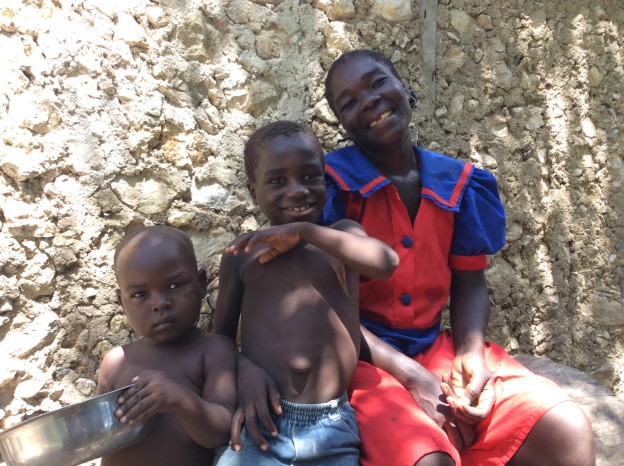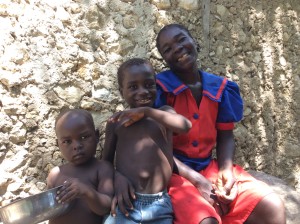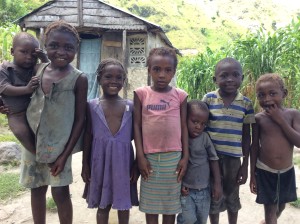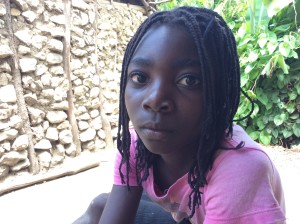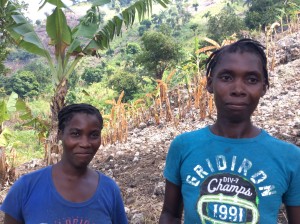It has been more than three years since the women of Mannwa graduated from our program. They were part of the first group of families we selected when we scaled up in the fall of 2010. We began working with them at the beginning of 2011.
Mannwa presented challenges from the start. Even during the selection process, we had difficulties. About half of the ultra poor families we found there, families who needed the program, refused to join. We made a series of trips to the neighborhood, meeting with prospective members individually and with other community members in group meetings, but we couldn’t convince them.
And just getting to Mannwa to hold all those extra meetings and make all those extra home visits was not a simple matter. Mannwa is on the top of a mountain, and there are no roads that lead up to it. Even the ones that approach the bottom are challenging, especially during the rainy season, when they turn into muddy, rut-filled messes.
It took me almost three hours to hike up Mannwa’s steep face from the closest approach I could make with my motorcycle. When I finally reached the summit. There’s a small plateau that spreads out across the ridge as it widens at the top. I hiked across the fields of corn and pigeon peas that cover most of it until I arrived at Edrès’s home. He’s a tall, middle-aged farmer with a broad face and a wide smile. During the summer vacation, when his kids are home from school in Mirebalais, his yard is populated by children of all sizes – boys and girls, young women and men. You see them singly and in twos and threes, going back and forth doing their chores or playing their games. And they all resemble Edrès almost to comical degree.
He’s a local leader and a community agent for Partners in Health. He provides vaccinations, chlorine tablets for drinking water, and other simple health services, including referrals to the hospital at Rat Leta, in central Boukankare. He was also the president of a committee we created to support our work in and around the neighborhood, and he turned out to be its only active member. But he really was active, supporting us in all sorts of instances. He helped CLM members address cases of domestic violence and manage their health problems, he resolved community conflicts, and kept an eye on things when we weren’t there. At times, he just gave us advice, important because it came from someone who knew the community and its history much better than we ever would.
More recently, he had been the agent for the Haitian government’s extreme poverty program. This had given him an excellent way to continue to follow our graduates’ progress. He had just decided to give up that job. The constant hiking was getting to be too much. But his oldest son had passed through an open recruitment process and was ready to begin training to take over the job.
He and I talked first about Manie and Sorène, a mother and her grown daughter who moved into new houses right next to each other on the edge of the plateau. He felt good about Sorène. Joining the program had been hard for her. She eventually had to leave the father of her children because he refused to let her participate, even though he couldn’t keep their children fed. “She doesn’t waste anything,” Edrès explained. She had sold her cow because it wasn’t growing as she wanted it to, but she used most of the proceeds to buy goats and to invest in her farming. Most encouragingly, she had talked over the decision with Edrès, still recognizing him as someone who can give worthwhile advice. Her little daughters were flourishing. “She’d be doing even better, but she has trouble finding grazing land for the goats. She has to keep them out of other people’s farmland, but the grazing isn’t easy on her part of the hill.”
Manie was different. She had entered the program almost as poor as someone could be, living temporarily in a house she had been forced to sell to pay for her husband’s funeral. The new owner wanted her to leave. She didn’t have even a chicken she could have sold to start raising money to find a new place to live.
But she had only one teenage boy still living with her, and Edrès reported that they are managing. They had moved into a small house that our support had helped her build, and though she hadn’t done very well with her livestock, her children were taking good care of her. When I saw Jacquesonne, her youngest, later in the day as he was returning from the fields, he confirmed everything that Edrès told me. He had used his own farm earnings to buy his mother a pig to care for. They would share the profits. And his older brother was helping her out as well.
Then Edrès turned to the women from the other side of the ridge. “The women from Lalyann are all 10s. They’ve got cows and horses and mules, and are really moving ahead.”
He dragged out what I had thought would be a short talk into a long one because his wife and their kids wanted to make coffee for me before I headed on my way. But eventually I took off along the ridge that separates central Boukankare from its northeastern corner. I wanted to catch up with the women from Lalyann myself. For fifteen minutes I had broad views in both directions, but then I followed the narrow trail that descends on a long, straight diagonal into Wòch Djèp, the neighborhood where Rose Marthe lives.
I was most of the way down the path when I heard quick footsteps behind me. I turned and saw Rose Marthe herself, running to catch up, wearing a homemade dress of red and blue. She had been working in a field higher up the hill when she saw me in the distance, and didn’t want to risk missing me when I got to her home. She was out of breath from running, but we were close to her house so we decided to walk the rest of the way.
She told me about the challenges she had faced over the months since I had seen her. She had lost a child, still a baby. The boy had caught a high fever with diarrhea, and she wasn’t able to get him to the hospital in time. It is a four-hour hike. The funeral had been a big expense, but she had managed. She’d had to sell off some livestock, “But I didn’t sell the cow,” she said. She hadn’t been able to buy one until two years after she had graduated, and she wasn’t going to waste it. She sold some of her goats instead. “I still have four mother goats and a kid,” she added.
Her other challenges have involved her husband. Sepavre is a farmer, and he works hard. But he’s also unreliable. He occasionally sells off some of her assets to pay for things he wants. He never sells off enough to really send Rose Marthe backward, but he keeps her from making as much progress as she could. He had recently fallen from a mango tree when I saw her. He hadn’t been hurt badly, but he was still recovering. She had to care for him, and she had to do the work of both of them as well.
Nevertheless, Rose Marthe was plowing ahead. Her younger children were ready to return to school, and she had helped her oldest daughter and her sister prepare to move in with men whom they had chosen to try to make their lives with. She was sorry that her girl had decided to start a family, rather than to continue with school, but she was resigned to the fact, and was glad to have been able to help her get started.
We left her house together. She was heading back up to her field, and I wanted to follow the trail as it turned back farther down into Lalyann. I had other women to visit.
Magalie was next on my list. I saw most of her children. They are all still small. But she herself was off farming farther down the valley. Nevertheless, the kids told me that everyone was healthy, their mother’s livestock was in good shape, and that they were ready to return to school.
I reached Omène’s house next. She wasn’t there, but her husband, Elga, was. He was hanging around the house because a machete wound he had recently received in his forearm limited what he could do. The arm had healed to all appearances, but he couldn’t yet work hard with his hand.
Elga was glad to see me. Omène and his other wife Chrismène were both working in a field higher up the slope. A neighbor had assembled a team to clear and plant a large plot of her land. Omène and Chrismène have livestock and gardens of their own, but they are happy to earn a few extra gourds with a hard day’s work.
Elga and I chatted about the first time we met, in January 2011. I had gone out on rounds, covering for Martinière, Omène’s case manager. Martinière had asked me to follow through with Elga for him. At the time, Elga ans Omène were living in Elga’s parents’ yard, and Omène was having lots of problems with her in-laws. Elga would travel a lot, chasing farm labor wherever he could find it, and whenever he was away his parents would treat Omène as a child, laying down the law for her, even threatening her. Omène was tired of it. She had complained to Martinière. He was happy to try to intervene, but he wanted to hear from Elga first. The problem would be very different depending on who Elga was inclined to side with.
Elga was on Omène’s side, 100%. He was embarrassed that he had put her in such an awful position, and was anxious to free her from it. Even four years later, he shook his head, remembering how his parents had behaved. I let Martinière know, and the two of them helped Omène get out from under his parents’ rule. “Things are fine now,” he explained, “ever since we moved down the hill into our own house. We can go back and forth, seeing each other when we need to, but everyone has their own place.”
Then we talked about each of his wives. Polygamy is not unusual in rural Haiti, but Elga, Omène, and Chrismène represent something like a best-case scenario. Elga is devoted to both, and has shown no interest that we’ve ever heard about in any other women. The two women accept each other and are on sisterly terms. The ten children are as one family.
This is a difficult moment for them all because Elga’s contribution to the two households is limited, but he’s making sure their livestock is in good shape. They’ve both increased their holdings a lot since graduation. And he exercises the hand as much as he can, trying to speed its recovery so he can get back into the fields. They’ll soon be peanuts to harvest in the east, near the Dominican border, and Elga is anxious for the work. “I owe it to Omène. We sold her calf to rent and extra field this year, but we lost the crop so the calf was wasted. She could have bought a horse instead.”
By now I was rested, and I was still anxious to see the two women. Elga filled my bag with avocados. He wanted to send a gift to Martinière. I was worried about carrying the extra load up the steep path to Mannwa, but I saw him sling the bag over his own shoulder. He said that I would never find the women unless he showed me where they were, and we set off. Omène’s oldest daughter, Natacha, sent us off with a final word: “Martinière deserves a spanking. He never comes to see us anymore.”
We were about halfway up the path when we turned off the main path. We walked across a field of pigeon peas, through a garden of plantain trees, and suddenly saw a team of a dozen workers clearing and planting a field. The two women were there, and they broke off from working and came running. Elga stepped back. He knew it was their time to talk with me, and we sat for a few minutes. We couldn’t talk very long because it was midafternoon already, and I wanted to be sure to get most of the way back to Mirebalais before the rain.
The women didn’t want to talk about very much except Martinière. They had seen him at the market in central Boukankare a few weeks earlier, and had been really happy about that, but they couldn’t imagine when he might visit them at home again. They know he has other work. They explained why they decided to take a few days of work in a neighbor’s field, too. School would be opening soon, and a little extra cash for books and other supplies would only help. Otherwise, they’d have to sell livestock.
As we said our goodbyes, they said the same thing that Natacha, Rose Marthe, and Magalie’s kids had said: “Kounye a, nou p ap janm wè w ankò?” “Is this the last time we’ll ever see you?” I tried to assure them. They know how hard it is to get to Mannwa. But I’ll always try to visit when I can. They hadn’t expected me that day, and another day will come when I’ll just show up.
The Elga picked up my bag – he decided he owed it to me to at least get Martinière’s avocados to the top of the hill – and we turned straight up the path. When we got to the top of the ridge, he handed me the bag and said, “It’s still a long way, but at least it’s downhill.” Then he headed home. And so did I.
